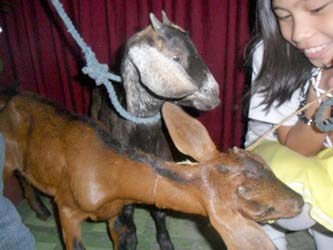Salvador Cariaga is originally from the Philippines and he serves his home country as a missionary who travels throughout North America. In the fall of 2011, Weyburn's Church of Christ welcomed Cariaga to share his message with their congregation and with the community of Weyburn.
In response to his home country's state of destitution, Cariaga founded a charitable organization called Give a Goat. He had realized that the agricultural problems plaguing the Philippines - depleted soil producing poor quality crops and farmers unable to afford seeds to plant - could potentially be resolved through goat-raising.
Goats produce rich fertilizer every day just by feeding off of loose grass and vegetation. They also produce highly nutritious milk, especially suited for a lactose intolerant country like the Philippines. With the sales from milk and fertilizer, farmers are able to buy their own seeds for new farms. Cariaga raises funds to purchase goats to give to farmers in the Philippines.
A Weyburn group, inspired by Cariaga, has done some fundraising for Give a Goat.
"We just distributed our first of 100 goats in Cagayan de Oro City," said Cariaga in January. "We called this batch the Weyburn Goats. Thank you for your help. It will make a difference in the lives of these kids."
Cariaga hopes to restore sound farming practices and make food production flourish, end hunger and poverty and bring about the means for real change through education. He also has long-held a vision for recovered migration for the Philippines. He hopes that the same reasons that led him to the United States to attend college at Oklahoma Christian University, such as unemployment, can be resolved so that his fellow emigrants can return to their home land and prosper.
With this vision in mind, Salvador gives goats. He teaches the goat-raisers how to properly care for the goats and when the goats have kids, he splits the litter with the raiser and gives to another family.
The goat program has allowed the organization to provide orphanages, schools, medical clinics, food pantries and training for organic gardening.
Though their reach has been growing, millions and millions of people still live in extreme poverty in the Philippines.
"It is our goal to continue to grow until there is no longer a need," said Cariaga. But giving goats alone does not improve the livelihood of the people or break the cycle of poverty.
"Without preparation, training and follow up, people will eat or sell the goats," he said."One might as well give them hand outs and money. Governments, churches and non-government groups do that all the time - giving goats without accountability measures - with little or nothing to show for it after two years."
Goats sometimes also get sick and require medication or trained personnel to guide the raisers. Goat-raisers don't have the funds for medicine and nutritional supplements, so these may need to be provided as part of the program.
"The cost of creating an infrastructure that will encourage the goat raising industry to thrive in the hands of the poor is much more than the cost of the goats themselves," said Cariaga. "But once the multiplication process takes traction, it can not only help a village, but will spread throughout the region and beyond."
Cariaga soberly admitted that the Philippines is still at the early stage in its fight against poverty.
"The fight against poverty is a fight. It is not easy. It is not simple. It is not cheap."
If poverty isn't difficult enough, nearly a thousand people died in December during a devastating flood in the southern Philippines.
"The disaster has given me opportunities to teach trade, not just give aid," said Cariaga. "I talk every day, several times a day, to small groups and large ones about self-sufficiency and preparing for 'rainy days'. I remind them that it is the poorest of the poor that suffer the most. They were challenged not to give up, to believe in themselves, in their country and especially God."
Humankind doesn't easily give up, however. Angelic helpers find ways to serve.
Ernest and Renae Andersen, from Bengough, were recently in the Philippines to help what was once an impoverished village in Cebu.
"Through their help and others of like mind, this village is now thriving and prospering," said Cariaga. "The Andersens hosted goat shows that allowed the kids to display their goats and get a chance to win prizes. They also bought food and treated the kids with hotdogs and marshmallows. Renae spent hours with the kids, teaching and playing with them."
The Andersens were able to offer an experience as well as to take one with them. Not everyone can travel, but anyone can make a difference in the lives of people in the Philippines. One hundred dollars buys a goat for a family and Cariaga offers many direct ways to help with raising funds. Visit giveagoatnow.org for more information.



